Introduction to Substance Use Disorder
Substance Use Disorder (SUD) is a treatable mental health condition characterized by an uncontrolled urge to consume substances despite adverse consequences. It affects an individual’s brain and behavior, making it difficult to resist the impulse to use drugs or alcohol. Recognized by significant impairment in daily life, it can result in issues such as impaired judgment, social problems, and withdrawal symptoms. As a prevalent issue affecting millions, understanding the complexity of SUD, its treatment options, and support strategies is critical for aiding recovery.
Recognizing Substance Use Disorder and its Impact
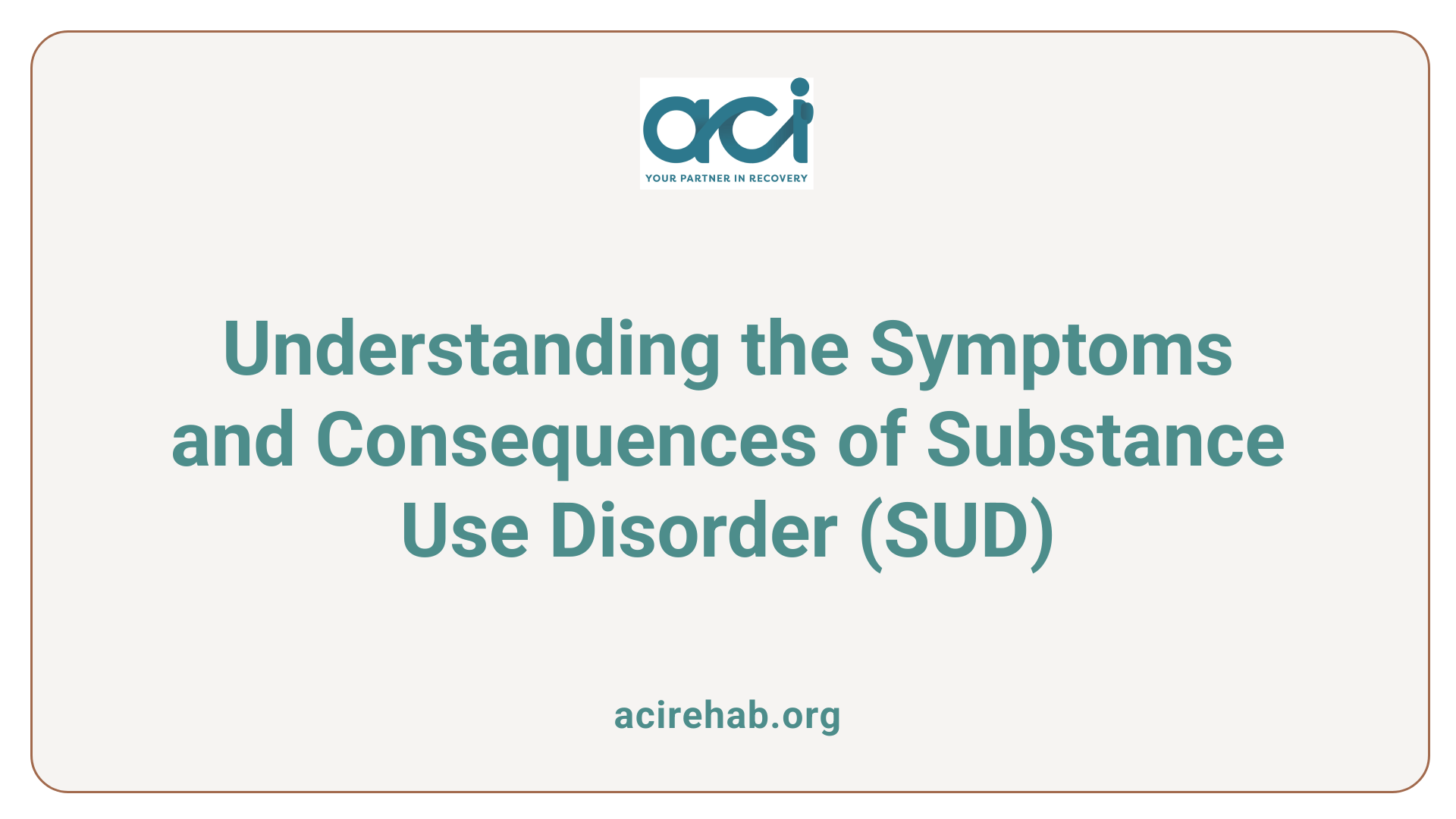
What are the symptoms and consequences of Substance Use Disorder (SUD)?
Substance Use Disorder (SUD) manifests through a range of symptoms including:
- Impaired Control: A strong craving for the substance and the inability to limit use.
- Social Problems: Difficulty in maintaining relationships due to substance use.
- Hazardous Use: Engaging in risky behaviors while under the influence.
- Physical Effects: Developing tolerance, which necessitates increasing doses, and withdrawal symptoms when not using.
The consequences of SUD extend well beyond the individual. They significantly impact mental and physical health. SUD leads to:
- Deteriorating Relationships: Friends and family often suffer emotional strain due to the behavior changes associated with addiction.
- Financial Instability: Spending on substances can lead to economic hardships, affecting one’s quality of life.
- Increased Health Risks: Individuals may face heightened risks of accidents, injuries, and a range of health complications, including overdose.
Moreover, substance abuse alters brain function, particularly in areas responsible for judgment, decision-making, and behavioral control. Over time, these changes can develop into chronic issues, further complicating recovery efforts and reinforcing the need for comprehensive treatment strategies.
Approaches to Treatment for SUD
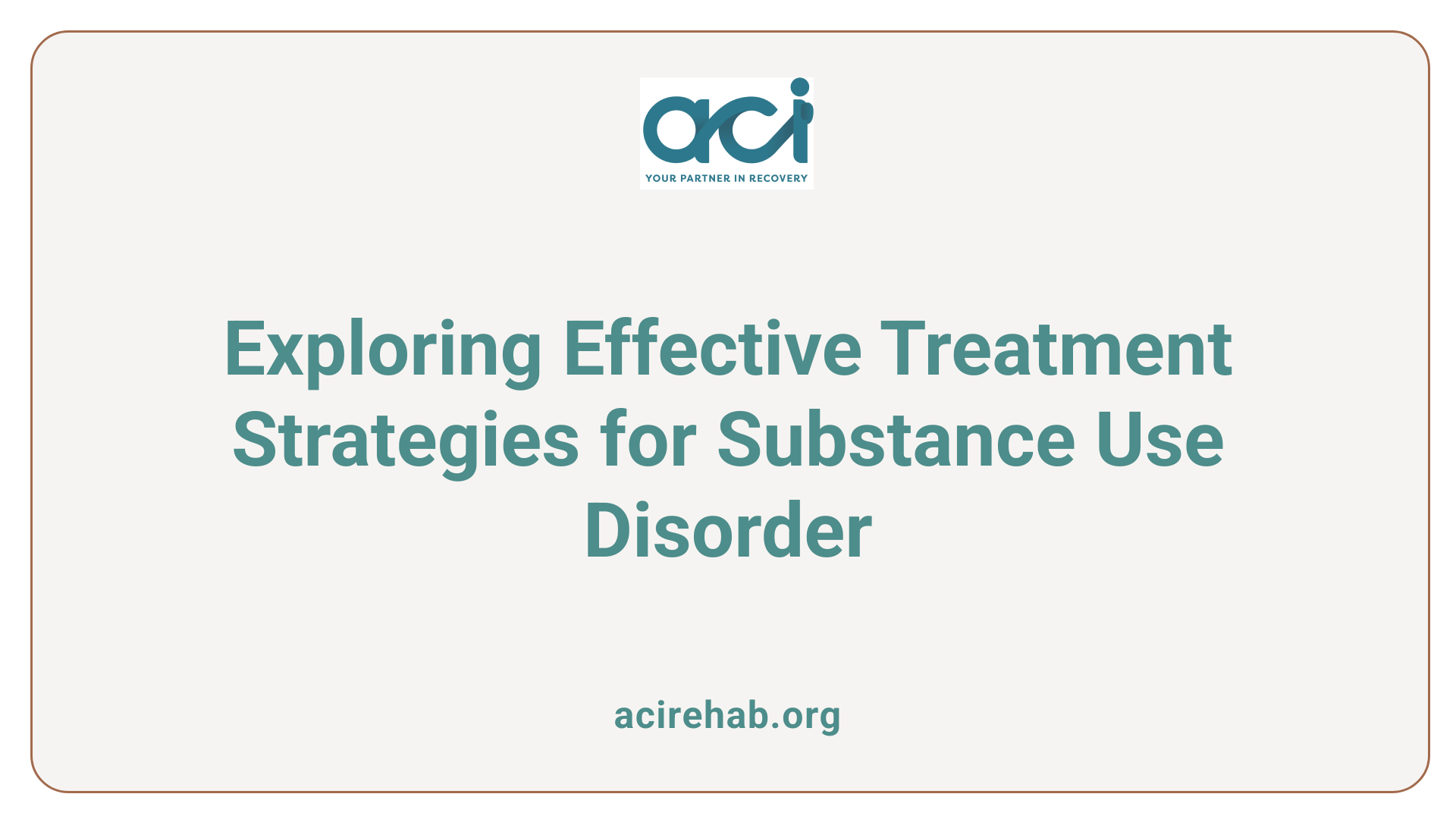
Integrated Treatment of Co-occurring Disorders
Substance use disorder (SUD) frequently coexists with various mental health issues like anxiety, depression, and bipolar disorder. Effective treatment should ideally address these co-occurring disorders simultaneously. This integrated approach can lead to improved recovery outcomes and better management of both substance use and mental health conditions.
Behavioral Therapy and Medication
Treatment for SUD typically combines medication and behavioral therapies. Medications, such as buprenorphine or naltrexone, help in reducing cravings and managing withdrawal symptoms for specific addictions. Behavioral therapies, including Cognitive Behavioral Therapy (CBT) and Dialectical Behavior Therapy (DBT), are essential in modifying patients’ attitudes and behaviors concerning drug use, assisting them in managing triggers, and enhancing the effectiveness of medications.
Role of Detox and Withdrawal Management
Detoxification is a critical initial step in treating SUD, designed to manage withdrawal symptoms safely. This process helps to transition individuals from substance dependence to recovery. Following detox, individuals can engage in psychotherapy and group therapy, further supporting their sobriety and coping mechanisms. The recovery journey continues with ongoing support from healthcare providers and mutual-aid groups, which are vital for preventing relapse.
| Treatment Component | Description | Importance |
|---|---|---|
| Integrated Treatment | Simultaneous care for SUD and mental health | Prevents overlap effects of disorders |
| Behavioral Therapy | Skills training to manage substance triggers | Enhances long-term recovery outcomes |
| Detox & Withdrawal Management | Initial phase to address physical dependence | Ensures safe transition to sobriety |
Effective treatment necessitates a comprehensive methodology, guiding the individual towards a sustained recovery while addressing both substance use and mental health issues effectively.
Supporting a Loved One Through Recovery
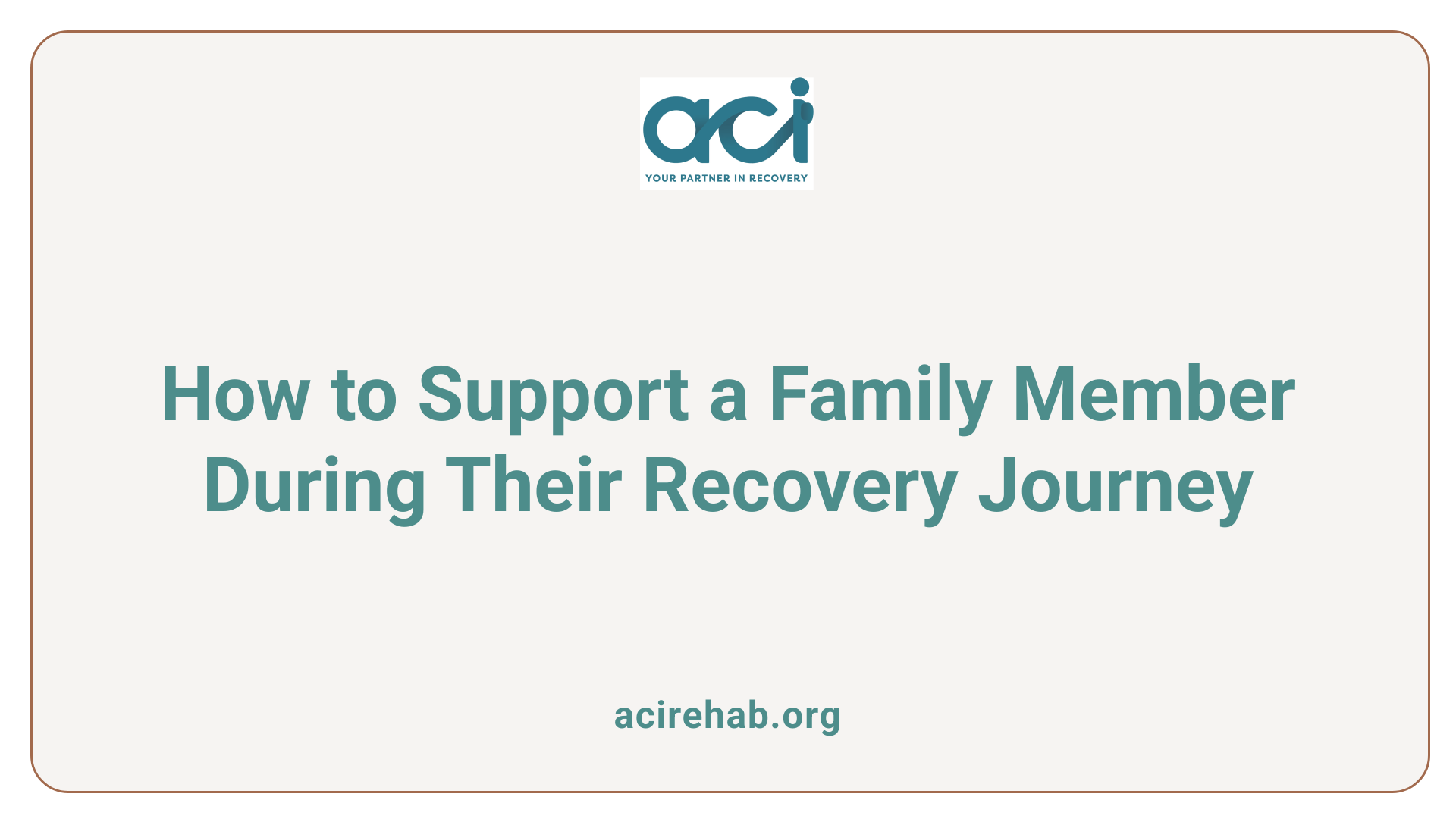
How can you help a family member struggling with addiction and depression?
To help a family member grappling with both addiction and depression, start by consulting with trusted addiction and mental health professionals. They can provide invaluable guidance on appropriate treatment options tailored to your loved one’s needs.
Consider organizing an intervention. This process involves planning and assembling a team of family and friends who can express their concern and motivate your loved one to seek help. Here’s a structured approach:
- Gather a support team: Involve those close to the individual, as their support can be powerful.
- Plan the intervention: Outline specific outcomes, rehearse what each person will say, and maintain a caring tone throughout.
- Include a professional: Especially if the situation is high-risk, having an addiction specialist on board can lend expertise.
After the intervention, maintain ongoing support. Encourage participation in therapy, mutual-aid groups, and provide reassurance throughout their recovery journey.
The importance of interventions
Interventions can be crucial in addressing addiction, as direct conversations may not always lead to action. They help articulate concerns and present the treatment plan convincingly, making it more likely that the individual will consider seeking help.
Continuous support and setting boundaries
Continuous support is vital for recovery. However, it’s equally important to establish boundaries to prevent enabling behaviors that can aggravate addiction. This balance helps ensure both your well-being and that of your loved one. By providing unconditional love and encouragement, while also making clear the need for professional help, you can contribute positively to their recovery process.
Resources and Support Networks for SUD
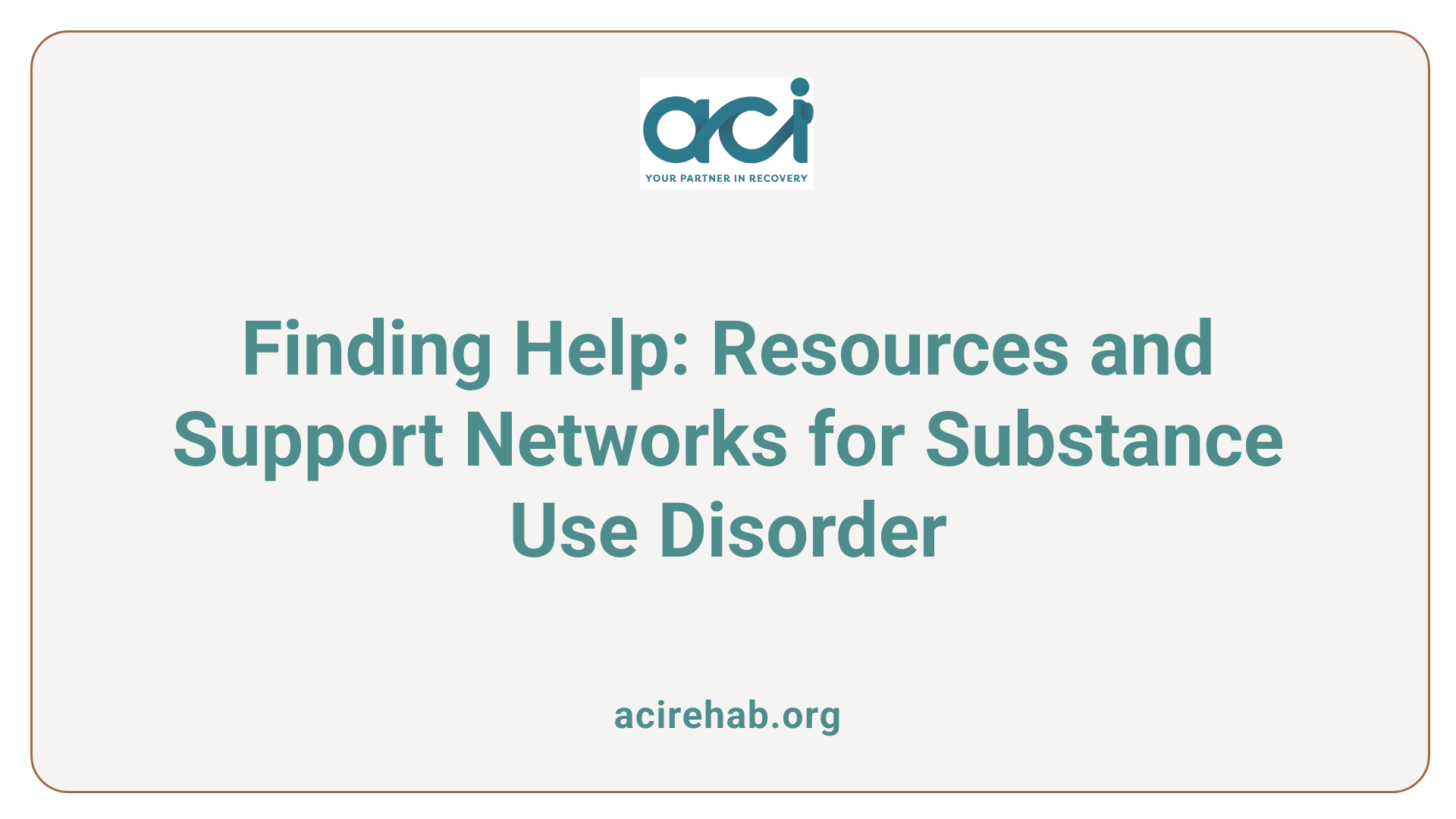
Role of Support Groups
Support groups play a crucial role in helping individuals on their journey to becoming drug-free. They offer emotional and practical support throughout the recovery process. The peer interaction and shared experiences within these groups can significantly enhance motivation and commitment to sobriety.
Participating in support groups allows individuals to develop effective coping strategies to manage triggers and high-risk situations, which is essential for preventing relapse. Additionally, these groups can improve members’ self-esteem and social skills, reducing feelings of isolation that often accompany substance abuse.
National Helplines and Counseling Services
National helplines, such as the SAMHSA National Helpline (1-800-662-HELP), provide essential, confidential support for individuals and families facing substance use disorders. These resources offer treatment referrals and information regarding mental health and substance use disorders, helping to connect individuals with local treatment facilities and support systems.
Community and Family Involvement
Community and family involvement are vital in the recovery process. Families play a crucial component in identifying and addressing substance use issues, often being the first to notice changes in mood or behavior. Encouraging open dialogue and understanding can foster an environment that supports recovery.
Moreover, engaging in community programs that promote education and prevention of substance use disorders can strengthen social networks and promote healthier environments. Families are encouraged to prioritize their own health and well-being while supporting their loved ones through recovery.
Effective recovery involves a blend of professional help, support networks, and the commitment of family and friends, reinforcing the collective effort needed to overcome substance use disorder.
Coping Strategies and Long-term Management
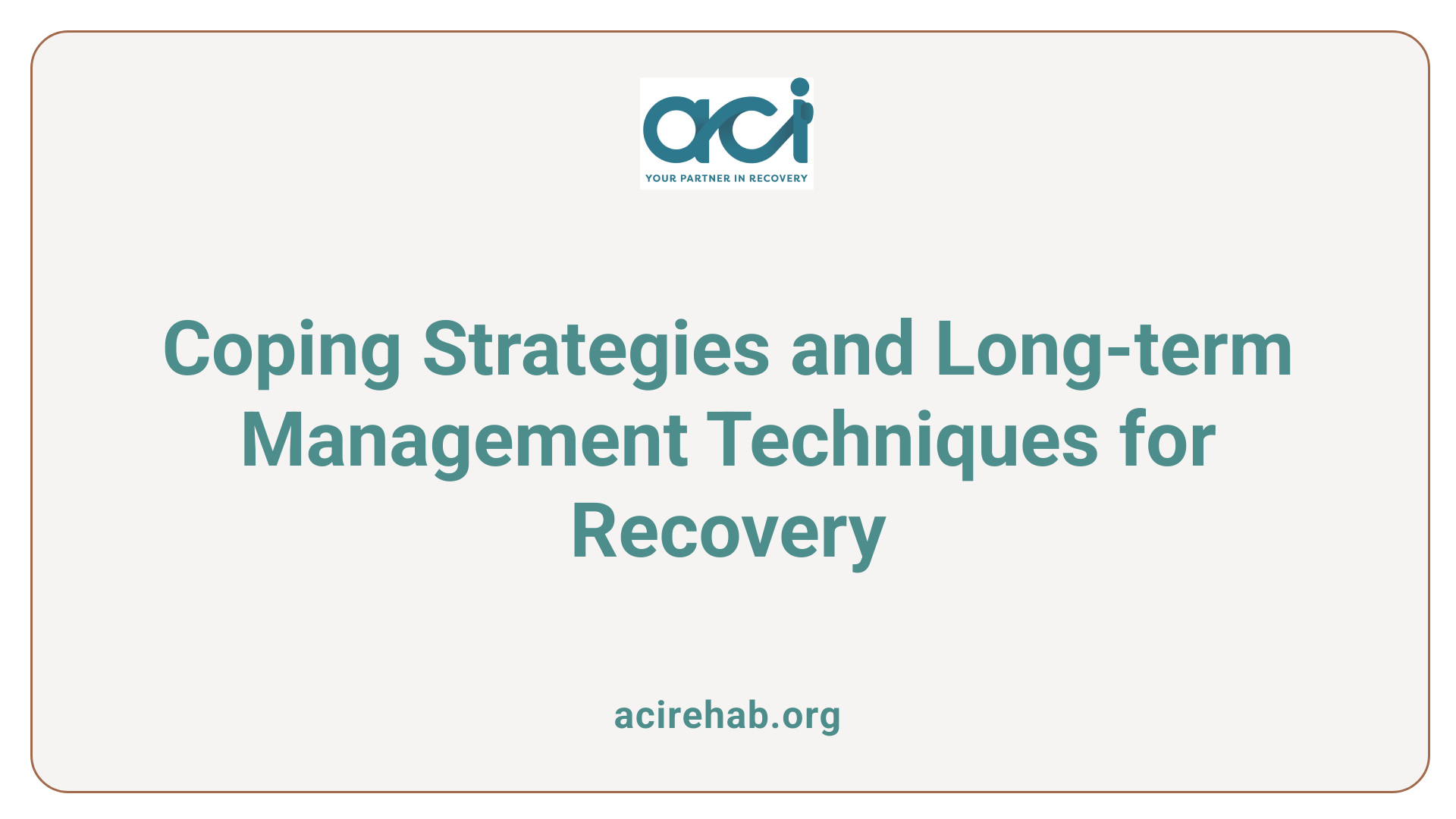
What are the coping strategies for alcohol use disorder (AUD)?
Coping strategies for alcohol use disorder (AUD) can be diverse and effective in supporting long-term recovery. Engaging in activities that offer distractions from drinking is a fundamental approach. Activities such as hiking, sports, or hobbies can fill time that might otherwise be spent drinking.
Additionally, participating in religious or spiritual practices can provide a strong support network and sense of purpose that helps many individuals with their recovery. Another key strategy is substituting alcoholic beverages with non-alcoholic options, both to manage cravings and to create new habits around social situations.
Long-term support systems
Avoiding social situations or individuals that may trigger the urge to drink is crucial for sustaining sobriety. Establishing a robust long-term support system, such as regular participation in groups like Alcoholics Anonymous (AA), fosters accountability and provides an essential community of understanding.
Friends and family can play a significant role by encouraging positive activities and offering emotional support, which helps strengthen the recovery journey. Peer support groups can also provide an outlet for sharing experiences and learning from others who have faced similar struggles.
Self-care for caregivers
For caregivers, prioritizing self-care is critical as their role can be emotionally taxing. This includes seeking their own support structures, joining caregiver support groups, and ensuring they maintain their physical and mental health. Caregivers should recognize their own limits and ensure they engage in activities that replenish their energy and mental well-being, ensuring that they are in a good position to support their loved ones effectively.
Combining these coping strategies with ongoing support systems can greatly enhance resilience in the face of AUD and facilitate a successful recovery journey.
Conclusion: The Path Toward Recovery
Substance use disorder is a challenging condition that demands comprehensive and sustained efforts for effective management and recovery. From recognizing the signs and symptoms to engaging in diverse treatment strategies, the journey requires both professional intervention and personal resilience. Enlisting the support of family, friends, and community resources, coupled with ongoing therapy and support groups, can significantly enhance the recovery process. It is essential to approach SUD with empathy, patience, and dedication to foster an environment conducive to lasting change and improved well-being.
References
- Substance Use and Co-Occurring Mental Disorders
- What Is a Substance Use Disorder? – Psychiatry.org
- National Helpline for Mental Health, Drug, Alcohol Issues – SAMHSA
- Helping Someone with a Drug Addiction – HelpGuide.org
- Treatment and Recovery | National Institute on Drug Abuse (NIDA)
- Recovery Resources – DEA.gov
- Substance Use Disorder (SUD): Symptoms & Treatment
- Drug addiction (substance use disorder) – Diagnosis and treatment
- Treatment of Substance Use Disorders | Overdose Prevention – CDC
- Find help for substance abuse – USAGov

